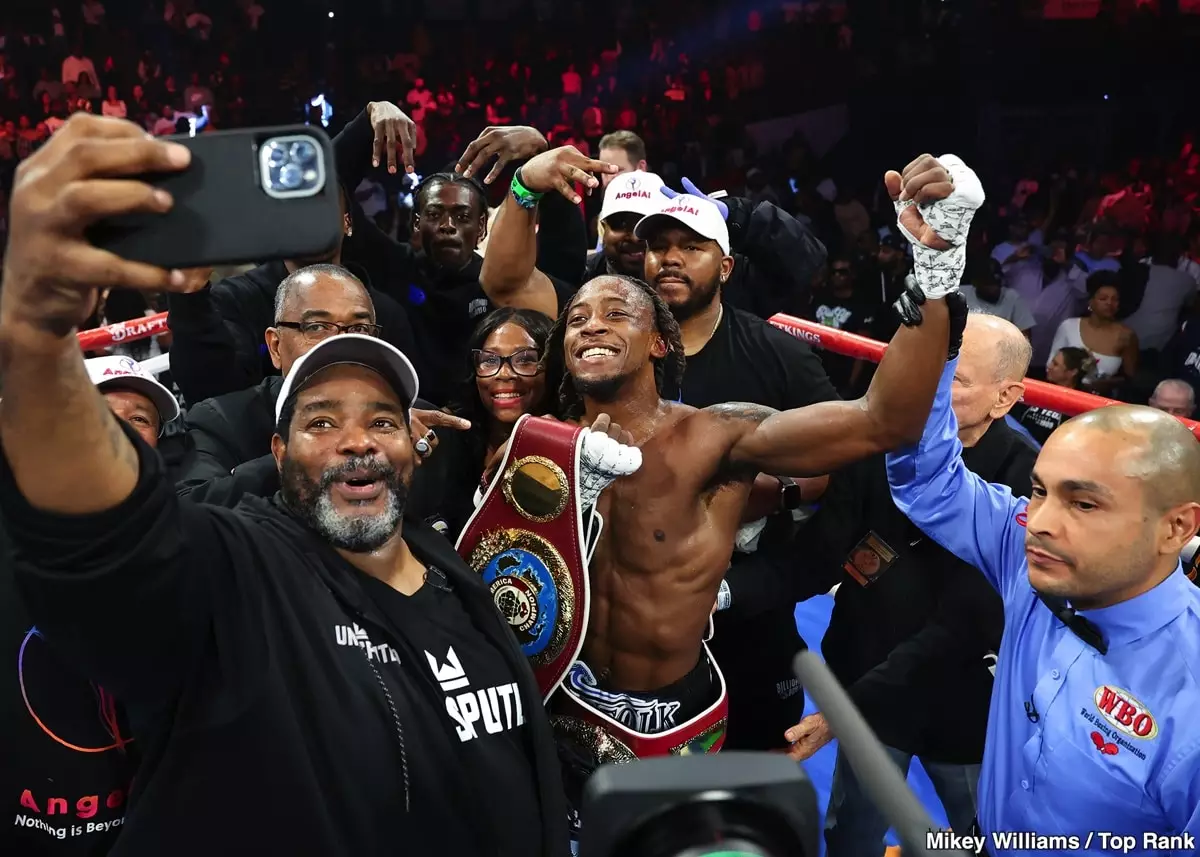As boxing fans eagerly await the February 14 showdown between WBO lightweight champion Denys Berinchyk (19-0, 9 KOs) and rising star Keyshawn Davis (12-0, 8 KOs), discussions swirl regarding what this fight means for the future of the 135-pound division. Set to take place at the inconspicuous yet storied Hula Theater within Madison Square Garden, this encounter has sparked both intrigue and skepticism in equal measure. With Mike Coppinger reporting that the fight is nearing its finalization, the anticipation builds toward a potentially electrifying evening on ESPN.
Both fighters are signed with Top Rank, making the matchmaking seem straightforward. However, beneath this seemingly simple collaboration lies a more substantial focus on building and promoting Keyshawn Davis as a future star in boxing. As the promotional machine revs up, questions arise regarding whether this emphasis on visibility might overshadow the competitive essence of the sport.
The choice of Berinchyk as Davis’s first significant opponent raises eyebrows. At 36 years old, Berinchyk is seen by some as the most vulnerable champion in the current lightweight landscape. Top Rank’s selection might reflect a strategy aimed to minimize risk for Davis. Yet, the perception of an easy pathway becomes a double-edged sword; while it may serve to elevate Davis’s status, it also risks diminishing the integrity of his accomplishments.
Berinchyk is no mere punching bag; his past struggles—even nearly falling to Nahir Albright—highlight that he possesses qualities which could present difficulties for Davis. This becomes particularly evident when analyzing Davis’s ambitious claims that he will dominate the division. While self-assurance is vital in boxing, it’s crucial to remain grounded in reality when facing seasoned opponents like Berinchyk.
Self-Promotion vs. Substance: The Dilemma of Keyshawn Davis
Keyshawn Davis has adopted the mantle of self-promotion with gusto. His brash remarks demonstrate a great dedication to building an image, insisting that he is “the best in entertainment and performance”. However, the distinction between promotional flair and actual talent raises eyebrows. Many perceive Davis’s proclamations as trying too hard to assert himself, creating an air of insecurity rather than genuine confidence.
Interestingly, while Davis calls out renowned names like Gervonta Davis and Vasily Lomachenko, critics note his avoidance of challenging fights against rivals such as Andy Cruz, who has handed him losses. This selective focus paints a picture of a fighter more interested in financial gain and the glitz of stardom than the rigorous trials that typically accompany a burgeoning career in boxing. In emphasizing potential mega-fights to the point of overshadowing less lucrative yet more meaningful matches, Davis risks alienating fans who may question his intentions.
When discussing the upcoming bout, both fighters demonstrate a keen understanding of each other’s strengths and weaknesses. Davis’s admiration for Berinchyk’s footwork and boxing IQ is perhaps an indication that he is taking this fight with due seriousness—undeniably, a hallmark of a writer or commentator. While Davis boasts of his size and physicality in the division, he needs to confront the reality that Berinchyk is a shrewd opponent who has fought his way to the top.
The insistence from Davis that no lightweight can last the distance with him, while conveniently overlooking his own distance fights, reinforces the notion that the psychological games in boxing can blur the lines between reality and perception.
Davis’s aspirations for an unification bout, perhaps against the likes of Gervonta Davis or Raymond Muratalla, underscores his ambition. Yet, it remains essential for Davis to prioritize practical matchups that can fortify his career rather than merely seeking the limelight or financial windfall. Building a reputation takes more than self-promotion; it requires genuinely daunting challenges that put one’s skills to the test. In attempting to hurry the process, he risks finding himself on shaky ground.
Moreover, boxing fans often value authenticity over bravado. A unified champion rooted in pedigree, ability, and formidable victories resonates more than hollow claims of supremacy. As Davis continues his march toward prominence, only time will tell if he can transition from flashy promoter to legitimate contender—a journey that demands resilience and unwavering resolve amid the uncertainties of the ring.
The bout between Denys Berinchyk and Keyshawn Davis, while laden with promotional potential, serves as a critical juncture for both fighters. It poses a question for Davis: Will he champion his way effectively within the ranks and emerge not just as a star, but as a worthy champion? Or will he find the mask of promotion stripped away, revealing the vulnerabilities that exist beyond bravado?

